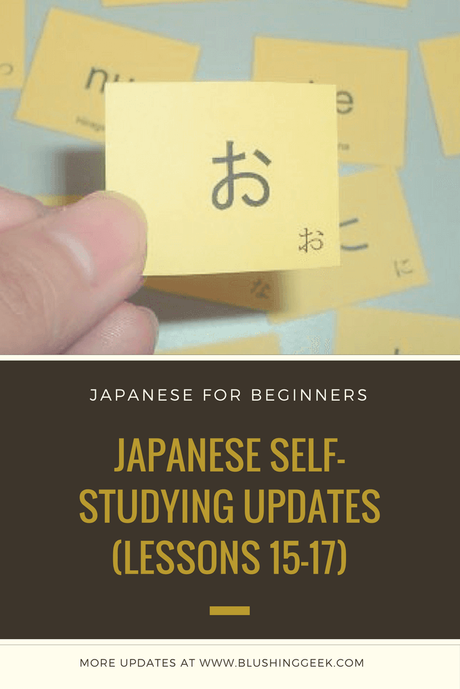I don’t usually get amused when Sunday comes as the next day would be Monday. But as soon as I started studying Japanese, that changes. Ofcourse I still have that dreadful feeling especially at night every Sunday but I’m a bit excited too for Monday to come. Why’s that? It’s not because of work obviously (shh, don’t tell my boss hehe) but because it’s every Monday that I’ve got to share with you guys what I’ve been learning Japanese so far. Teehee *wink
Last week, I stared learning the TE or request form of verbs in Japanese and for this week’s lessons, I’ve got to learn the TE form of all verbs in Japanese language. As I’ve said in my previous post, verbs in Japanese transforms into many forms with their own set of instructions as well. The previous two lessons we’re easy to understand but now that I reached lessons 15-17, I have to say that I was a bit overwhelmed at first. I guess it’s safe to say that Japanese verbs is one of the most complicated things you’ve got to learn in order to speak and understand Japanese. But hey, a little challenge wouldn’t hinder my desire to learn the language, so keep them coming *wink.
And again, this is not an attempt to create a tutorial but just sharing what I’ve learn from Misa-sensei’s Grammar Lessons for Absolute Beginners in Youtube. You can see what I’ve been learning from Lessons 1-14 here.
Note: Click on the lesson number to read the whole update.LESSON 15: TE Form for ku and gu ending verbs
For verbs that ends with ku
- change ku into ite
namae => name
doa => door
mado => window
me => eyes
Examples:
kaku => to write/to draw
kaku => kaite => kaite(i)ru (kaiteimasu)
- Please write your name
=> Namae wa kaite (informal)
=> Namae wa kaite kudasai (forma) - Please draw a picture
=> E wo kaite (informal)
=> E wo kaite kudasai (formal) - I’m drawing manga
=> Manga wo kaite(i)ru (informal)
=> Manga wo kaite(i)masu(formal) - I’m writing kanji
=> Kanji wo kaite(i)ru (informal)
=> Kanji wo kaite(i)masu (formal)
kiku => to listen
kiku => kiite => kiite(i)ru (kiiteimasu)
- Please listen to the music
=> Ongaku wo kiite (informal)
=> Ongaku wo kiite kudasai (formal) - I’m listening to music
=> Ongaku wo kiite(i)ru (informal)
=> Ongaku wo kiite(i)masu (formal)
akeru => to open (structure: “something” wo akeru)
Note: Transitive and intransitive verbs exists in Japanese.Transitive verb => I/you/someone makes an action
Example: I open the door
Intransitive verb => It’s nobody’s action
Example: The door is open
aku => opens (structure: “something” wa/ga aku)
aku => aite => aite(i)ru (aiteimasu)
aite(i)ru (aiteimasu) => something is open now
- The door opens
=> Doa ga aku - The shop is open now
=> (O)mise wa aite(i)ru (informal)
=> (O)mise wa aite(i)masu (formal) - Eyes are open
=> Me wa aite(i)ru (informal)
=> Me wa aite(i)masu (formal) - Suzuki is sleeping. But his eyes are open
=> Suzuki wa nete(i)ru. Demo me wa aite(i)ru (informal)
=> Suzuki wa nete(i)masu. Demo me wa aite(i)masu (formal)
naku => to cry
naku => naite => naite(i)ru (naiteimasu)
- The baby is crying
=> Akachan wa naite(i)ru (informal)
=> Akachan wa naite(i)masu (formal)
For verbs that ends with gu
- change gu into ide
puuru => pool
Examples:
oyogu => to swim
oyogu => oyoide => oyoide(i)ru (oyoideimasu)
- I’m swimming in the pool
=> Puuru de oyoide(i)ru (informal)
=> Puuru de oyoide(i)masu (formal) - The fish is swimming
=> Sakana wa oyoide(i)ru (informal)
=> Sakana wa oyoide(i)masu (formal)
kagu => to sniff/smell
kagu => kaide => kaide(i)ru (kaideimasu)
- The dog is sniffing
=> Inu wa kaide(i)ru (informal)
=> Inu wa kaide(i)masu (formal)
isogu => to hurry
isogu => isoide => isoide(i)ru (isoideimasu)
- Please hurry!
=> Isoide! (informal)
=> Isoide kudasai (formal)
New vocabularies learned from this lesson:
- namae => name
- doa => door
- mado => window
- me => eyes
- akeru => to open
- aku => opens
- naku => to cry
- puuru => pool
- oyogu => to swim
- kagu => to sniff/smell
- isogu => to hurry
- hayaku => hurry, quick
LESSON 16: TE Form For mu/bu/nu Ending Verbs
=> change the ending into ndeganbaru => to work hardganbaru => ganbatte => ganbatte(i)ru (ganbatteimasu)
ganbatte => keep it up / do your best / good luck
kyaba-kura => hostess club
hosuto-kuraba => host club
bun => sentence
tori => bird
Examples:
nomu => to drink
nomu => nonde => nonde(i)ru (nondeimasu)
- Please drink water
=> Mizu wo nonde (informal)
=> Mizu wo nonde kudasai (formal) - I’m drinking tea
=> Ocha wo nonde(i)ru (informal)
=> Ocha wo nonde(i)masu (formal) - I’m drinking with friends
=> Tomodachi to nonde(i)ru (informal)
=> Tomodachi to nonde(i)masu (formal)
yomu => to read
yomu => yonde => yonde(i)ru (yondeimasu)
- Please read this sentence
=> Bun wo yonde (informal)
=> Bun wo yonde kudasai (formal) - I’m reading a book
=> Hon wo yonde(i)ru (informal)
=> Hon wo yonde(i)masu (formal)
Note: TE form for gu and mu/bu/nu ending verbs use de:
- gu => ide
- mu/bu/nu => nde
yobu => to call (out) / invite
yobu => yonde => yonde(i)ru (yondeimasu)
- Please call me Misa
=> Misa tte yonde kudasai (informal)
=> Misa to yonde kudasai (formal)
- My name is Michael. But please call me “Mike”.
=> Namae wa Maikeru. Demo Maiku tte yonde kudasai (informal)
=>Namae wa Maikeru. Demo Maiku to yonde kudasai (formal)
sumu => (will) live in (somewhere)
sumu => sunde => sunde(i)ru (sundeimasu)
sunde(i)ru (sundeimasu) => to live (now) / currently living (somewhere)
- I will live in Japan
=> Nihon ni sumu - I live in Japan
=> Nihon ni sunde(i)ru (informal)
=> Nihon ni sunde(i)masu (formal) - Where do you live?
=> Doko ni sunde(i)ru? (informal)
=> Doko ni sunde(i)masu ka? (formal) - I live in the US
=> Amerika ni sunde(i)ru (informal)
=> Amerika ni sunde(i)masu (formal)
asobu => to hang out
asobu => asonde => asonde(i)ru (asondeimasu)
- I’m hanging out with friends
=> Tomodachi to asonde(i)ru (informal)
=> Tomodachi to asonde(i)masu (formal)
tobu => to fly
tobu => tonde => tonde(i)ru (tondeimasu)
- Birds are flying
=> Tori wa tonde(i)ru (informal)
=> Tori wa tonde(i)masu (formal)
shinu => to die (not really a nice word to say even if it’s in TE form)
shinu => shinde => shinde(i)ru (shindeimasu)
shinde(i)ru (shindeimasu) => to be dead
Instead of shinu, you can use the following instead:
- nakunaru => to pass away
- nakunarimashita => passed away
New vocabularies learned from this lesson:
- ganbaru => to work hard
- ganbatte => keep it up / do your best / good luck
- kyaba-kura => hostess club
- hosuto-kuraba => host club
- bun => sentence
- tori => bird
- yobu => to call (out) / invite
- tte (informal) / to (formal) are used to quote “” something.
- sumu => (will) live in (somewhere)
- tobu => to fly
- shinu => to die
- nakunaru => to pass away
- nakunarimashita => passed away
LESSON 17: TE Form for suru, su and kuru Ending Verbs
For suru and su ending verbs
- change them into shite
basuke => basketball
shukudai => homework
denki => light / electricity
keshigomu => eraser (comes from keshi (erase) and gomu (rubber))
butan => button
apaato => apartment
okashi => candy / sweets / snacks
paateii => party
Examples:
suru => to do
suru => shite => shite(i)ru (shiteimasu)
- Please play basketball
=> Basuke wo shite (informal)
=> Basuke wo shite kudasai (formal) - I’m playing tennis
=> Tenisu wo shite(i)ru (informal)
=> Tenisu wo shite(i)masu (formal) - Please do your homework
=> Shukudai wo shite (informal)
=> Shukudai wo shite kudasai (formal)
- Please study
=> Benkyou shite (informal)
=> Benkyou shite kudasai (formal) - I’m studying / I’ve been studying
=> Benkyou shite(i)ru (informal)
=> Benkyou shite(i)masu (formal) - I’ve been studying Japanese
=> Nihongo wo shite(i)ru (informal)
=> Nihongo wo shite(i)masu (formal) - To travel
=> Ryokou suru - I’m traveling / I’ve been traveling
=> Ryokou shite(i)ru (informal)
=> Ryokou shite(i)masu (formal)
kesu => to turn off / delete / erase
kesu => keshite => keshite(i)ru (keshiteimasu)
- To turn the lights off
=> Denki wo kesu - Please turn the lights off
=> Denki wo keshite (informal)
=> Denki wo keshite kudasai (formal)
osu => to push / press
osu => oshite => oshite(i)ru (oshiteimasu)
- Please push the button
=> Butan wo oshite (informal)
=> Butan wo oshite kudasai (formal) - I’m pushing the button
=> Butan wo oshite(i)ru (informal)
=> Butan wo oshite(i)masu (formal)
kasu => to lend / rent
kasu => kashite => kashite(i)ru (kashiteimasu)
- Please lend me your eraser
=> Keshigomu wo kashite (informal)
=> Keshigomu wo kashite kudasai (formal) - I’m renting an apartment (to someone) *not rent from ~
=> Apaato wo kashite(i)ru (informal)
=> Apaato wo kashite(i)masu (formal)
naosu => to fix
naosu => naoshite => naoshite(i)ru (naoshiteimasu)
- Please fix the watch
=> Tokei wo naoshite (informal)
=> Tokei wo naoshite kudasai (formal) - I’m fixing a car
=> Kuruma wo naoshite(i)ru (informal)
=> Kuruma wo naoshite(i)masu (formal)
For kuru
- change uru into ite
kuru => to come
kuru => kite => kite(i)ru (kiteimasu)
- Please come here (lit. come this way)
=> Kocchi kite (informal)
=> Kocchi kite kudasai (formal)
- Please come to my house
=> Uchi ni kite (informal)
=> Uchi ni kite kudasai (formal)
motte kuru => to bring
motte kuru => motte kite => motte kite(i)ru (motte kiteimasu)
- Please bring some candy
=> Okashi wo motte kite (informal)
=> Okashi wo motte kite kudasai (formal)
motte iku => to take
- Please take it to the party
=> Paateii ni motte itte (informal)
=> Paateii ni motte itte kudasai (formal)
New vocabularies learned from this lesson:
- basuke => basketball
- shukudai => homework
- denki => light / electricity
- keshigomu => eraser (comes from keshi (erase) and gomu (rubber))
- butan => button
- apaato => apartment
- okashi => candy / sweets / snacks
- paateii => party
- ryokou suru => to travel
- kesu => to turn off / delete / erase
- osu => to push / press
- kasu => to lend / rent
- naosu => to fix
- motte kuru => to bring
- motte iku => to take
Now that I’m done with verbs, I wonder what will I learn next. I’m really excited, hehe. To be honest, there were times that I want to proceed with another lesson when I think I already got the hang of the current lesson I’ve been studying, but I need to do it in baby steps. You see, when I hurriedly tried to learn something, most of the times, I ended up not learning at all. So baby steps for now *wink.
For the earlier lessons, you can refer to my previous updates for lessons 1-14. If you want to study Japanese language as well, I am highly recommending Misa-sensei’s youtube tutorial for Japanese Grammar Lessons for Absolute Beginners. Jaa mata ne!


